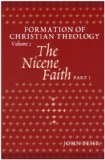

 |

|

The average rating for The Nicene Faith, Vol. 2 based on 2 reviews is 4.5 stars.
Review # 1 was written on 2019-11-27 00:00:00 Steve Bahnsen Steve BahnsenAnother outstanding contribution to Christian theological thought by John Behr. Behr makes explicit from the outset the problems of conceiving of Nicene theology as "Trinitarian theology" or the "gradual development of a dogmatic edifice," as well as the problems of caricaturizing Nicene opponents or reducing Nicene theology to shorthand formulae. Having acknowledged such difficulties, Behr pulls the reader into a rich investigation of the Nicene faith by way of its staunchest defenders: Athanasius, Basil of Caesarea, Gregory of Nazianzus, and Gregory of Nyssa (along with their chief opponents). He shows great facility in the primary sources of all such figures that are available, not dismissing the non-Nicenes out of hand, but investigating their own arguments on their own merits and showing where they fell short of confessing the crucified Jesus as the locus of the revelation of God the Father and bearer of the Spirit (the starting point of Nicene theology). Behr doesn't present a merely historical account, either. Although he offers a careful investigation of the past, his work by no means remains relegated to "mere history," but provides a touchstone for further theological contemplation (as does Nicene theology itself), both implicitly and explicitly. One only wishes there were further volumes (to investigate, for example, the contributions of Chalcedon and Maximus the Confessor which he mentions in the Epilogue). These books are of supreme value for anyone interested not only in Christian history, but Christian theology in general, as they deal with the first principles of Christianity. As Behr writes: "The way to Nicaea is not plotted retrospectively from Nicaea, as if it were itself the starting point, but with reference to the revelation of God in Christ, the subject of the Christian confession from the beginning; if Nicaea is a definitive moment in Christian identity, it is because it preserves the truth of *the* definitive moment. If we overlook this basic fact, then we risk both misunderstanding the landmarks that we think we already know and, more seriously, substituting other first principles, taking something other than Christ and his Cross as constitutive of the identity of Christianity." |
Review # 2 was written on 2020-12-12 00:00:00 Lawrence Barraza Lawrence BarrazaBrilliant analysis of the theological debates throughout the 300s. Part 1 includes a long chapter with TONS of names. From that there is analysis of Arius. One big point Behr makes is that not all who were opposed to Nicaea were "Arians" and there was much more complexity among both the heretics. Another big point that Behr makes is that some of our modern ways of approaching this history is misguided. For example, Athanasius and the Cappadocians were not merely philosophizing about the inner life of the Trinity, somehow apart from God's actions in the world. Instead, they were reasoning from the scripture and the work of God in Jesus. They were not separating "Christology" from "Soteriology". The best of this book is when Behr gets to covering the specific works and thought of Athanasius, Basil, Gregory of Nazianzus and Gregory of Nysa. These four were giants and Behr's analysis and summaries of their theology is brilliant. |
CAN'T FIND WHAT YOU'RE LOOKING FOR? CLICK HERE!!!